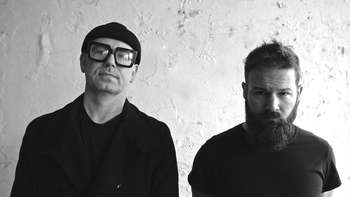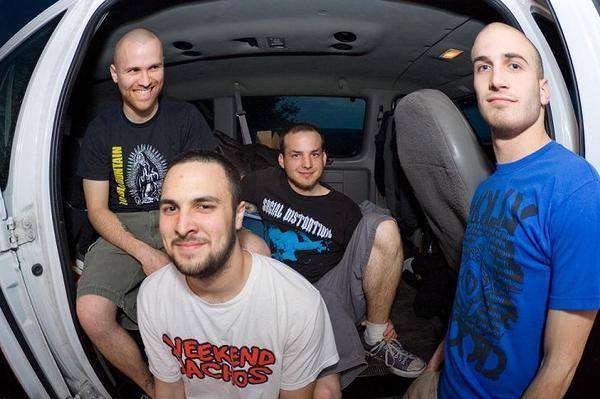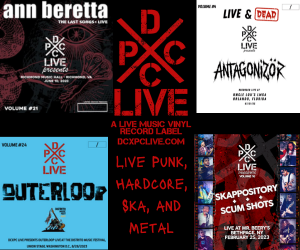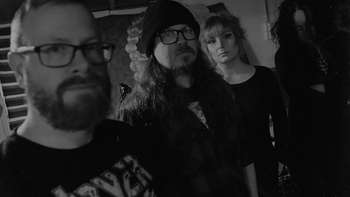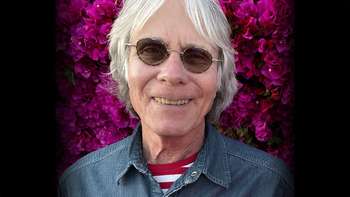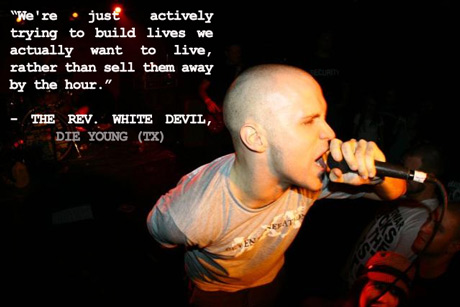
Scene Point Blank: You hear bands called this all the time, but if ever a band ever really deserved the title of "hardest working band in hardcore," I think it would be you guys. What are your thoughts on bands that do little touring, if at all, and survive off of Internet hype?
The Rev. White Devil: To be honest, I think a lot of kids out there like a lot of insincere and contrived garbage, but that's just my opinion. I don't think hardcore bands have to be "hard-working," so long as they are at least honest about who they are. Bands don't always have to be touring machines. Sure, I do think struggling is a very essential part of hardcore, and I am flattered that people do quite often say that we are the most hard-working band, or whatever, but you know, hardcore can be whatever you want it to be. It can just be fun and simple. If other people catch on to it and go nuts about your fun and simple band then good for you and your band. Die Young (TX) does things the way we do them because that's just how we want to live. We don't want to be at home working. We want to be on the road, doing new things, seeing new places, chillin' with new people, looting as much as we can. We don't even have to make much money at all to live this way. Every day is a new continental breakfast at a hotel we didn't pay for, or a new unsuspecting grocery store. We're provided for, haha. It's a busy life, but it's also a very simple life--there's time to read, talk to your friends, explore and basically just do all the things we love to do. As hard as people think we work as a band, we don't exactly do it to "get ahead" or be the "biggest band", or whatever-the-fuck. We're just actively trying to build lives we actually want to live, rather than sell them away by the hour--that's just not for us. I'm definitely more concerned with how deeply people are connected with our music and message than how many records we're actually selling.
Scene Point Blank: A lot of the lyrical content for your songs seems to draw from philosophical writings as opposed to the typical lyrical content that draws from the events of ordinary life. How important are sociological and philosophical issues to hardcore? To many hardcore is about moshing and singing-along, not the message. Your thoughts?
The Rev. White Devil: As I said before, I don't think hardcore has got to be like Die Young (TX) makes it - it doesn't always have to be serious and socio-political. But on the other side of the coin, there's a severe lack of bands pushing the envelope intellectually these days, and maybe there always has been. I know hardcore wasn't started by brainiacs at Ivy League schools, but I wouldn't call Minor Threat a band that was composed of meatheads either. So yeah, hardcore and punk were started by pissed off urban youth who were just plain fucking pissed about just about everything whether they could really articulate their rage well or not. Here we are nearly thirty years later, and I sincerely hope a fair lot of us involved in this community would have learned actually know what we're all so pissed off about. We've had time to evolve, you know? So much of the rage you see in hardcore these days is so misguided and self-defeating. I'm not entertaining some delusion here that we, as a minority of adolescents and young rebels, are actually going to "change the world."
In many senses, I hope the world as it is burns straight to fucking ground, but if any of us are really going to do change things, or attempt to, we will only be successful, or stand a slight chance at being successful, if we move beyond this music and this community and try to reach the masses. And I definitely think hardcore/punk can be a great starting point for that, too, strictly because of the progressive and rebellious aspects of it. Skeptics may ask, "If we don't have some concern about doing just that then why involve bigger issues in hardcore?" For me, personally, it is like this: you don't have to be a scholar or university student (I'm certainly not either of the two) to address more sociological type topics, or just realize plain and simple who or what the cause of all your rage is. Is it the silly kid at the show with the haircut you don't like? If it is, I actually feel kind of sorry for you. Or is it the system which breeds rage day in and day out--the schools which teach us lies and raise us to spend the rest of our lives working, the dead end jobs where we are treated as less than our bosses and have to sell away the hours of our lives to compete for the better living wage? And what about the governments who lie and manipulate the masses, and the economic system that caters to the ruling class alone and upholds their power over most of us? I guess the point I'm getting at here is that there's a lot more to be pissed at in the world today, in Hardcore today especially, than stupid scene drama.
What goes on in this scene is really insignificant. There are people being killed throughout the world in the name of the America, and in turn people in other parts of the world want to see all of us fucking dead, and plenty of kids in the "scene" these days would rather hear the same bullshit about backstabbers at shows than focus on things that are eventually going to affect all of us. I guess that's their prerogative, but I think that's a sort of denial. I always felt hardcore was about confrontation, not denial. The only thing we ought to be denying here is authority, if you ask me, but we should definitely be denying authority through confrontation. Philosophical ideas and sociological topics, as unpopular as they may be, have always got to have some kind of voice in hardcore/punk because they are part of our human experience and the awful realities this music was meant to be a release from. To deny those issues is to deny the reality of the lives we live. We are all affected by politics, by economics, by religion, and so forth, whether we like it or not.
Scene Point Blank: You cite artists like Catharsis and Integrity as major influences. What is it about these artists that had such a profound affect on you?
The Rev. White Devil: I think Integrity has been a major influence for just about every hardcore band in the past 15 years (including Catharsis) that has been incorporating metal elements into hardcore. Certainly, that has created a LOT of dogshit, but Integrity up until the 2000 stuff always blended the two perfectly if you ask me. I got Humanity is the Devil when I was like 15, and to be honest, it was over my head. It took me a few years to kind of grow into really understanding the concepts behind the music and appreciate them. I always dug the music and felt the rage of it, but it took some traumatic times in my high school years for me to really latch on to Dwid's lunacy. I have always loved the imagery in Integrity's artwork, too. I know a lot of people aren't fans of hardcore being a sort of art form like other styles of music, but I think it's great, and Integrity was definitely one of the premier bands that brought those artistic elements to hardcore music.
Even though I'm an atheist, Catharsis has always been a sort of religious experience for me. That band represented a completely new vision of life for me at a very pivotal time in my life when I was kind of at the fork in the road of following my dreams or falling into line with school and work and all that. Brian's lyrics have always been purely inspirational, and I think they are possibly some of the best lyrics I've ever read for any kind of music. I love the brave idealism and apocalyptic urge that Catharsis embodied, and I've done my best thus far to carry that torch with Die Young (TX). I also am in love with the fact that those kids sacrificed virtually everything to be in their band for 8 years, and practically killed themselves to keep it going and make some of the best Hardcore records ever. That's passion. I think Catharsis belongs in the same category of bands as Black Flag, because they really did make their band their entire lives, and I think that's why their music will continue to reach people for years and years--it was way more than music. It's just a shame more kids never knew and still don't know about them. Honestly, if it wasn't for Catharsis, Die Young (TX) might not exist. It definitely wouldn't be what it is.
Scene Point Blank: You also seem to be a huge fan of philosophers like Noam Chomsky and Friedrich Nietzsche. Why them?
The Rev. White Devil: Nietzsche and Chomsky are kind of household names when it comes to either linguistics and American politics, or Western philosophy. They are/were both brilliant for sure, and I generally agree with much of what they have to say (though there are plenty of exceptions, of course) but they are not the only philosophers I read by any means. We dropped their names on the Survival Instinct advertisements just to arouse interest of hardcore kids who may actually be seeking a bit more lyrical substance than they might be getting from the average fair these days.
Scene Point Blank: On your last EP, Survival Instinct, you guys covered the song "For the Kids" by Trial. Why did you choose to cover that particular song? Are there any other songs that you would like to cover in the future?
The Rev. White Devil: Trial is a very important band for us due to their lyrics alone, and I generally feel they were overlooked in their time. We covered "For the Kids" to try and keep the spirit of Trial and bands like Trial (who valued "message" as much as, or more so than music) alive for at least another generation of hardcore kids. Trial was definitely among the first bands that I ever got into that took hardcore and straightedge ideals to a higher level - one of a social and political statement of rebellion, rather than just being a clique for kids who want to be clean. I will always cherish that band for introducing me to so many new ideas when I was a sixteen-year-old kid. As for covers in the future, I don't know, we've done quite a few lately. It's probably time for us to chill on covers for a while.
Scene Point Blank: In addition to the upcoming full-length, you've also got a split 7" with Invade coming out on Double or Nothing Records. How did you team up with them? What songs are going to be on there? You also recorded an Integrity cover - what song did you choose to record and why?
The Rev. White Devil: Double or Nothing is run by the same friends of ours who help run Eulogy, and we needed to do a sort of teaser release for the new full length due to some objectionable material that Eulogy didn't want us to include on the full length. So Double or Nothing offered to let us release said material on vinyl so that we could help Eulogy avoid potential legal headaches and we could still have our fun, too. I'd elaborate more, but I really shouldn't, haha. Just pick up the release when it comes out around New Year 2007, and you should be able to figure out what I'm talking about. We're stoked to do the split with Invade because they are an intensely message-oriented band from New York. We don't really know them, but we have known about them as a band for a while so we asked them to do the split, and luckily enough for us, they were down. And of course, we did "ATF Assault" for the soon to be released Integrity tribute on your label, Mike. We decided to do "ATF Assault" because it is James Nealy's favorite Integrity song, but he's not in the band anymore, and he didn't even play the guitar tracks for the recording (I did), so yeah...it's still a rad song and it's about the Branch-Davidian Compound/David Koresh catastrophe that happened in Waco, Texas, back in the early 90s. Hey, we're from Texas, why not?
Scene Point Blank: In addition to your duties as a vocalist you also run your own record label. What is the current state of True Destiny Records? Do you have any new releases in the works?
The Rev. White Devil: True Destiny is a dead label, my friend. Thanks to Die Young (TX) consuming all my time and causing me to live without an income, and most of the True Destiny bands breaking up, I just had to give up on the label thing. I've got plenty of CDs in my closet if anybody wants them. I've got a whole lot of fucking debt, too. I advise anyone who wants to put out hardcore records to keep their day jobs, because reproducing and trying to sell the damn things alone will suck you dry financially, and it takes a lot more time to do it right than I had expected. It'd probably be a different story with True Destiny Records if I wasn't in Die Young (TX) or if we were just a weekend warrior type band, but we're not.
Scene Point Blank: You also started your own print zine. What makes this print zine unique when compared to the hundreds of others out there? What can we expect in the next issue?
The Rev. White Devil: I'd like to be working on another zine right now, but preparing for the new album has been taking up all my time. I have only done one issue so far, but hopefully I'll have another one out by the New Year. Anyway, my zine is predictably called â??The Messageâ? and I suppose it is different from most other zines in that it is strictly about punk and hardcore from a social/political perspective. There are not any reviews so far, and there's not really anything about the scene. I chose to interview bands who I felt were significant for their ethics and beliefs rather than because they are "all the buzz" or whatever. I do include my own personal writing about various subjects, so if anyone is into Die Young (TX)'s lyrics and message, I'd say you'd generally be into what the zine is. It's basically Die Young (TX) but in more of an essay form. The next issue will be much of the same subject matter, just different bands/people to be interviewed. I've got a formula and I plan to stick with it!
Scene Point Blank: Since you've literally traveled the world with Die Young (TX), are there any particular bands, zines, philosophers that you've come across would suggest to our readers to seek out that they might be unaware of?
The Rev. White Devil: To say particularly would be a long, long, long reply. When it comes to music, I hope that North American kids realize that good hardcore/punk music doesn't just come from the US. There are great bands all throughout all the places we've been to: Central America, Puerto Rico, Eastern Asia, and kids in those places have even turned us onto bands in South America. A lot of these bands are never going to have recording budgets or good equipment due to their economic circumstances, but the commonality between most all of them is that you can feel the heart and emotion they put into the music. If there's one thing regarding punk music that traveling in Die Young (TX) has shown me, it's that hardcore and punk are more vitally universal than most of us can even begin to imagine. As for writers/philosophers that kids on tour have turned me on to, one that I have been reading a lot lately who I feel is an extremely important voice is Derrick Jensen. He's an American, and he's alive right now, but his ideas are very compelling, and I think they are going to be talked about for a long time to come.
Scene Point Blank: What does the future for Die Young (TX) look like?
The Rev. White Devil: It looks like one giant blur of circle pits and stripes in the road whizzing by. Can't wait!
Words: Michael
Graphics: Matt
Photography by John Campbell.

